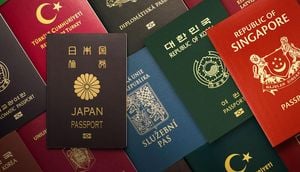Military tensions around Taiwan have escalated with the recent deployment of China's aircraft carrier Liaoning, prompting increased vigilance from Taiwan's Defense Ministry. On December 3, 2024, representatives from Taiwan confirmed they were monitoring the movements of the Liaoning, which is seen as part of China's broader military strategy amid rising geopolitical tensions.
The Liaoning, China's first aircraft carrier, is believed to be heading toward Taiwan, raising concerns over potential military drills. This maneuver follows President Lai Ching-te's tour of Pacific allies, which Beijing perceives as provocative. Analysts have speculated about the timing of the Chinese military exercises coinciding with Lai's overseas mission, indicating NATO's advancing geopolitical position amid local tensions.
At a recent press conference, Sun Li-fang, the spokesperson for Taiwan's Defense Ministry, stated they are aware of the vessel's current position but withheld specific details due to the sensitive nature of the information. "The Ministry of National Defence takes the enemy situation seriously and handles this matter with utmost consideration. Preparations against potential threats have been implemented rigorously," Sun noted, without confirming media reports about drills potentially beginning as soon as December 3.
The increased military presence and the operations of the Liaoning come after China has conducted several significant military exercises around Taiwan earlier this year, including the Joint Sword operations, which serve as reminders of China's longstanding claims over the self-governing island. The narrative surrounding Taiwan's sovereignty remains contentious, with China asserting its claims and routinely sending military forces close to the island.
Recent reports indicate the East China Sea area is becoming busier, showing the heightened military activity around Taiwan and nearby waters. Unofficial sources relayed intelligence assessments indicating the possibility of upcoming war games as being high. This tense atmosphere was underscored by the presence of Russian naval forces acting near Taiwanese waters, participating together with Chinese destroyers, simulating joint operations.
Intelligence findings reveal around 40 Chinese vessels operating near Taiwan, with the Liaoning leading the charge within the East China Sea region. This mobilization appears to form part of China's broader military strategy to assert presence over the region.
Notably, the U.S. has shown interest as it observed the Liaoning's patrol approach through its satellite monitoring systems. Images captured by Landsat 8 and 9, which are overseen by the United States Geological Survey, detail the carrier's movement through the sea. Experts point out the significance of maintaining constant vigilance over Taiwan’s defense posture and the necessity for potential military drills as part of operational readiness.
This week's situation marks another chapter in the fluctuative relationship between China and Taiwan, particularly under the administration of President Lai, who embraces Taiwan's sovereignty. The Taiwanese government has reiterated its commitment to uphold peace and open communication with Chinas, yet it faces significant challenges due to Beijing’s stringent stance against any form of independence.
Local defense analysts believe Taiwan's military will continue to adapt and prepare for unexpected challenges, reinforcing its defense capabilities to deter any aggressive maneuvers from the Chinese military. The insistence from representatives like Sun is intended to project strength and readiness, amid speculations surrounding potential conflicts. Taiwan’s government remains committed to monitoring developments closely, as risks intensify surrounding its territorial integrity.
The situation exemplifies the deepening complications within the Taiwan Strait where military posturing is intricately linked to political narratives and international relations, particularly related to U.S.-Taiwan partnerships and China’s regional ambitions. The next few days may be telling as to whether tensions escalate or if diplomatic overtures can prevail.



